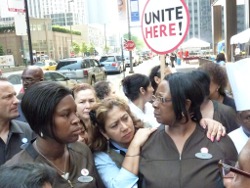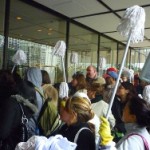Hyatt housekeepers in Chicago and 7 other cities to file injury complaints with OSHA
 On Tuesday November 9, Hyatt hotel housekeepers in eight cities across the U.S. are filing injury complaints with OSHA, reporting repetitive motion and other kinds of injuries sustained on the job. The landmark multi-city filing at 12 Hyatt properties that employ over 3,500 workers is the first of its kind in the private sector. A major peer-reviewed study of hotel worker injuries at 50 U.S. hotels operated by the five largest U.S. hotel companies was published in the American Journal of Industrial Medicine (AJIM) earlier this year. By company, housekeepers working at Hyatt hotels in the AJIM study had the highest injury rate of those hotels studied.
On Tuesday November 9, Hyatt hotel housekeepers in eight cities across the U.S. are filing injury complaints with OSHA, reporting repetitive motion and other kinds of injuries sustained on the job. The landmark multi-city filing at 12 Hyatt properties that employ over 3,500 workers is the first of its kind in the private sector. A major peer-reviewed study of hotel worker injuries at 50 U.S. hotels operated by the five largest U.S. hotel companies was published in the American Journal of Industrial Medicine (AJIM) earlier this year. By company, housekeepers working at Hyatt hotels in the AJIM study had the highest injury rate of those hotels studied.
The hazards associated with hotel work and service sector jobs more broadly have been largely invisible and unregulated. Serious injuries can happen slowly over time, through the repetition of certain tasks. Nevertheless, the long-term impact can result in debilitating injuries that in some instances require surgical intervention, physical therapy, or lead to permanent disability, like the loss of the full use of one’s arm.
The AJIM study found the highest injury rates among hotel workers to be in housekeeping. The study also indicated alarming differences in hotel injuries by race and gender, showing that women hotel workers were 50% more likely to be injured than men, and Hispanic women had almost double the risk of injury of their white female counterparts. The variation in injury rates across the major companies suggests room for remedies. Housekeepers working at Hyatt hotels in the AJIM study had the highest injury rate of those hotels studied, with a risk of injury almost twice that of the company with the lowest rate.
At some Hyatt properties, room attendants are required to clean as many as 30 rooms a day, nearly double what is commonly considered standard in the industry. Speeding up work by raising the room quota or adding room amenities can strain the body and lead to more accidents, like slipping on wet bathroom floors or tripping over furniture.
“Cleaning 25 to 30 rooms a day and making beds ‘hospital style’ demands working fast and lifting heavy mattresses,” says Maria Carmen Dominguez, who worked at the Grand Hyatt San Antonio as a room attendant before getting a broken tendon and permanently injuring her shoulder. “After surgery and months of physical therapy, I am still in pain anytime I lift my arm, even just to get dressed or brush my daughter’s hair.”
Dominguez also alleges that workers are discouraged from reporting injuries for fear of punishment, and that management has created a monetary disincentive for reporting injuries called “Safety Bingo,” with a lottery prize for housekeepers that grows every day that no injury is reported.
The complaints recommend to OSHA a number of remedies to reduce the health risks associated with housekeeping work. These recommendations include: fitted sheets to reduce the number of times that women must lift 100-plus pound mattresses to tuck sheets; long-handled mops and dusters, so workers do not have to get down on their hands and knees to clean the floors or climb bathtubs to reach high surfaces; and reasonable room quotas, so women no longer have to rush to finish rooms, risking slips and falls.
“There are common sense changes like fitted sheets, mops, or caps on daily room quotas that can make the difference between healthy bodies and hurt housekeepers,” says occupational health expert Gary Orr. “It is critical that we explore ways of making hotel work safe to reduce the high rates of injury that we see among housekeepers. Corporate-wide solutions are not only needed but are the most effective and less costly as they can be applied to multiple worksites.”
Complaints were filed by workers in Hyatt Hotels in the following cities: San Antonio, Chicago, San Francisco, Santa Clara, Los Angeles, Long Beach, Honolulu, and Indianapolis.


